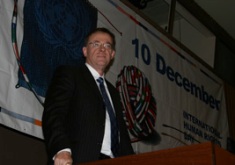In a statement released to mark Human Rights Day 2007 on December 10 a global communication advocacy organization is calling on governments, non-governmental organizations and the private sector to recognize and strengthen communication rights as a vital component in the development and implementation of political, economic, social and cultural policies.
The World Association for Christian Communication (WACC) states that communication rights are integral to achieving the United Nations' Millennium Development Goals which include eradicating poverty and developing global partnerships for development. The organization asserts, "There can be no genuine development without human rights and no social justice without communication rights".
"Human rights are not just a matter of civil and political rights," says the organization's general secretary, the Rev. Randy Naylor. "They include those rights that empower individuals and communities to express their needs, to make their voices heard, and to participate fully in their own development."
WACC promotes communication for social change by focussing on equal and affordable access to communication and knowledge and the relationship between communication and power.
The World Association for Christian Communication (WACC), formally established in 1968, promotes communication for social change. It believes that communication is a basic human right that defines people’s common humanity, strengthens cultures, enables participation, creates community, and challenges tyranny and oppression. WACC’s key concerns are media diversity, equal and affordable access to communication and knowledge, media and gender justice, and the relationship between communication and power.
Full WACC Statement:
On Human Rights Day 2007 the World Association for Christian Communication (WACC) calls for global recognition of communication rights.
Human rights are not just a matter of civil and political rights, but include economic, social and cultural rights. According to the Universal Declaration of Human Rights (UDHR), they affirm ‘the dignity and worth of the human person’ and ‘the equal rights of men and women’. Implementation of human rights demands recognition of communication rights – those rights that empower individuals and communities to express their needs, to make their voices heard, and to participate fully in their own development.
Communication rights enable people’s self-determination and contribute to a world based on peace and social justice. They are integral to achieving the Millennium Development Goals of eradicating extreme poverty and hunger; achieving universal primary education; promoting gender equality; reducing child mortality; improving maternal health; combating HIV/AIDS and other diseases; ensuring environmental sustainability; and developing global partnerships for development.
For the 60th anniversary of the UDHR in 2008, UNESCO has drawn up a plan of action emphasizing the importance of the right to education, the right to freedom of opinion and expression, including the right to seek, receive and impart information, the right to take part in cultural life, and the right to enjoy the benefits of scientific progress and its applications. Activities will begin on 10 December 2007 and culminate in next year’s anniversary. Yet, communication rights are conspicuous by their absence.
To complement UNESCO’s plan of action, a concerted response to civil society’s critique of the World Summit on the Information Society (Geneva, 2003 and Tunis, 2005) is needed. Civil society representatives lamented the ‘eclipse’ of human beings as the subjects of communication and development in the face of reliance on new technologies of information and communication as a panacea for the world’s ills.
Their post-WSIS statement, ‘Much more could have been achieved’, went further. It stressed that people’s common humanity ‘rests in our capacity to communicate with each other and to create community. It is in the respectful dialogue and sharing of values among peoples, in the plurality of their cultures and civilizations, that meaningful and accountable communication thrives.’
WACC calls on governments, non-governmental organizations, and the private sector to recognize and strengthen communication rights as a vital component in the development and implementation of political, economic, social and cultural policies.
There can be no genuine development without human rights; and no social justice without communication rights.

